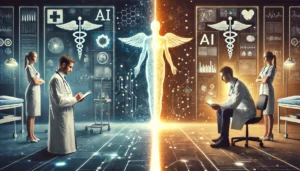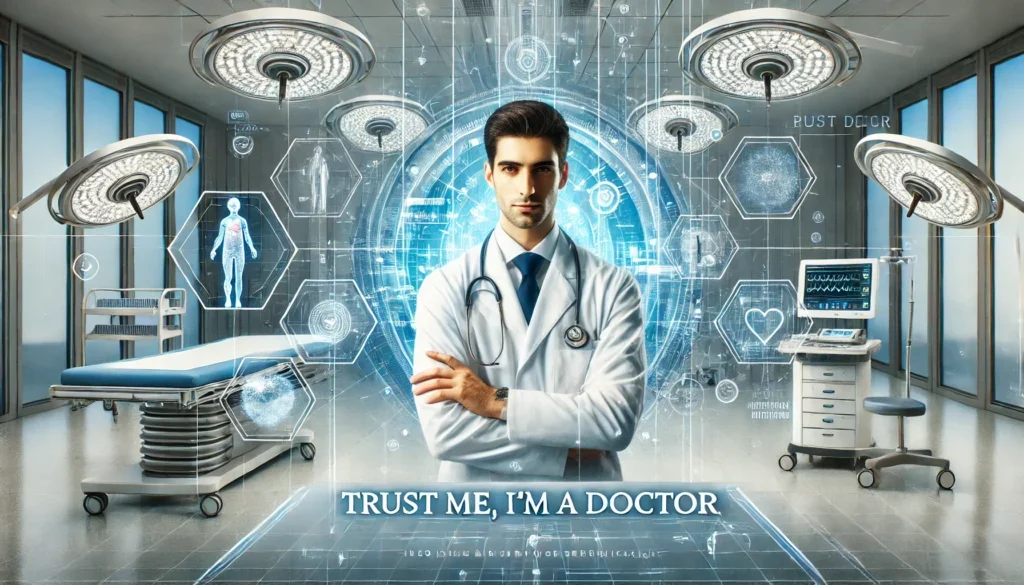Trust Me, I’m a Doctor: The Role of AI in Healthcare
A Glimpse of the Future
Marvel fans know the iconic J.A.R.V.I.S., Tony Stark’s AI assistant that helps him innovate, analyze, and create. Imagine having such an assistant in healthcare—a tool that could process data, analyze patterns, and even suggest diagnoses. It’s an exciting yet intimidating thought.
The question, though, remains: where does the art of medicine—the human connection, intuition, and care—fit into this technological revolution? In this blog, we’ll explore the integration of AI into healthcare, its potential, its challenges, and its impact on the patient-doctor relationship.
The Art of Medicine vs. The Data Revolution
 This process of collecting data and recognizing patterns is the essence of medicine.
This process of collecting data and recognizing patterns is the essence of medicine.
Now, consider this: isn’t this what machines do best? AI systems are designed to process vast datasets, identify anomalies, and recognize patterns faster than any human can. This technological capability places us on the brink of a medical revolution—but can machines truly replace the complexities of human interaction in healthcare?
What is AI and Why Does it Matter in Healthcare?
AI, or Artificial Intelligence, refers to machines mimicking human intelligence. In healthcare, its applications are transformative. OpenAI’s GPT, for instance, can analyze, interpret, and generate text in seconds—already proving valuable in clinical documentation and diagnostics.

Major players like Apple are heavily investing in AI-driven health apps, foreseeing a future where personalized medicine becomes the norm. Imagine a device that monitors your daily health, flags irregularities, and offers early interventions.
Consider these advancements:
- Genome Sequencing: Scientists can decode genomes from a single blood sample, identifying potential health risks.
- Virtual Drug Trials: AI models test new drugs virtually, reducing the time and cost of clinical trials.
- Smart Toilets and Wearables: Devices that analyze bodily outputs or monitor vitals to give real-time insights into your health.

This isn’t just science fiction—it’s the reality unfolding in labs and clinics today.
How AI is Already Changing Healthcare
AI is not just a concept; it’s actively being implemented in hospitals and clinics. In my department, we’ve adopted AI to streamline workflows.
Here’s how:
- Medical Documentation: AI tools help draft case sheets, discharge summaries, and certificates. Doctors dictate patient details, and AI formats the information instantly.
- Diagnostics: AI aids in interpreting ECGs and ABGs, offering a second layer of analysis that reduces error margins.
While still evolving, these systems are already enhancing efficiency, saving time, and allowing doctors to focus more on patient care.
Challenges and Limitations of AI in Healthcare
 Despite its promise, AI is not without flaws. Some key challenges include:
Despite its promise, AI is not without flaws. Some key challenges include:
- Bias: AI relies on data for learning. If datasets lack diversity, the AI can produce biased results, leading to inaccurate diagnoses or recommendations.
- Privacy and Transparency: Handling sensitive patient data requires stringent privacy measures and clear communication about how data is used.
- Accountability: Who is responsible when AI makes an error? AI can hallucinate or generate plausible but incorrect outputs, making human oversight critical.
- System Failures: AI is a tool, and like any tool, it can fail. A robust backup plan is essential for ensuring continuity in patient care.
Embrace AI or Resist Change?

The healthcare industry faces a pivotal choice: adapt to AI or risk falling behind. History offers valuable lessons—companies like Kodak and Nokia resisted technological advancements and paid the price. Meanwhile, innovators like Apple thrived by embracing change.
Doctors must adopt a similar mindset. AI isn’t here to replace us but to empower us. It’s a tool that, when used wisely, enhances our ability to provide care. The key is to integrate it thoughtfully, ensuring it complements—not replaces—the human touch.
Ethics, Trust, and the Patient-Doctor Relationship
The cornerstone of healthcare is trust. When we tell a patient, “Trust me, I’m a doctor,” it carries profound weight. Patients rely on us not just for knowledge but for empathy and care.
As AI becomes more prevalent, we must ensure it strengthens, not erodes, this trust. Patients need to see AI as an extension of their doctor’s expertise, not as a replacement. AI can assist in diagnosis and treatment, but it cannot replicate the compassion and intuition that define the art of medicine.
Conclusion: The Way Forward

AI is undoubtedly reshaping healthcare. From personalized medicine to preventive care, its potential is limitless. But it’s up to us as medical professionals to wield this tool responsibly.
Start small—explore AI in your practice, use it to enhance efficiency, and embrace its potential to transform patient care. Remember, while AI is powerful, the heart of medicine lies in the human connection.
The future is bright, and it’s ours to shape.
So let’s move forward with confidence, ensuring that no matter how advanced technology becomes, the words “Trust me, I’m a doctor” always carry the weight they deserve.



